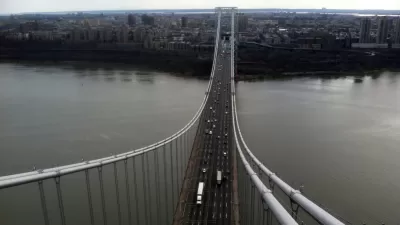Attorneys representing the state of New Jersey responded to the allegations of a class action lawsuit rising from the "bridge-gate" scandal.
Paul Berger digs into court documents filed Tuesday on behalf of a slew of defendants, including the state of New Jersey and the Port Authority," in response to a "class-action lawsuit filed on behalf of Bergen County commuters and taxi drivers who were stalled in traffic when two Fort Lee access lanes to the George Washington Bridge were closed without notice in September 2013."
The lawsuit has brought renewed focus on "Bridge-gate," with the back and forth between lawyers providing some perspective about the way the public thinks about traffic. "The class-action suit was filed at the beginning of 2014 on behalf of commuters and taxi drivers who say they used gas, lost time, and suffered emotional and economic damages because of delays caused by the closure of two of the three access lanes to the GWB in Fort Lee" according to Berger. In response, the defendants' case sums up like so: "You can’t sue for getting stuck in a traffic jam."
One class action lawsuit has already been tossed out of court. U.S. District Judge Jose Linares in June dismissed a case involving the same parties pack in August. The plaintiffs were, however, offered a chance to resubmit its case with additional facts to support its claims.
FULL STORY: Lawsuit over GWB lane closures assailed in court filings

Planetizen Federal Action Tracker
A weekly monitor of how Trump’s orders and actions are impacting planners and planning in America.

Congressman Proposes Bill to Rename DC Metro “Trump Train”
The Make Autorail Great Again Act would withhold federal funding to the system until the Washington Metropolitan Area Transit Authority (WMATA), rebrands as the Washington Metropolitan Authority for Greater Access (WMAGA).

DARTSpace Platform Streamlines Dallas TOD Application Process
The Dallas transit agency hopes a shorter permitting timeline will boost transit-oriented development around rail stations.

DC, Columbus Bike Share Fleets Introduce Cargo Bikes
Shared mobility is ‘growing up,’ with rental options increasingly expanding to include e-bikes, scooters, and cargo bikes.

Five Key Transportation Funding Proposals in Trump’s Budget
The President’s proposed 2026 budget would keep spending roughly the same for transit and rail and eliminate over $5 billion in funding for EV charging infrastructure.

LA County Creating Action Plan to Tackle Extreme Heat
Los Angeles County is creating a Heat Action Plan to help communities stay safe during extreme heat, with steps like adding more shade, improving buildings, and supporting the neighborhoods most at risk.
Urban Design for Planners 1: Software Tools
This six-course series explores essential urban design concepts using open source software and equips planners with the tools they need to participate fully in the urban design process.
Planning for Universal Design
Learn the tools for implementing Universal Design in planning regulations.
City of Charlotte
Municipality of Princeton
Roanoke Valley-Alleghany Regional Commission
City of Camden Redevelopment Agency
City of Astoria
Transportation Research & Education Center (TREC) at Portland State University
US High Speed Rail Association
City of Camden Redevelopment Agency
Municipality of Princeton (NJ)



























